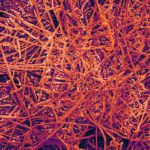Link to Pubmed [PMID] – 29752379
Mol. Cell Proteomics 2018 08;17(8):1627-1636
Bacterial pathogens use various strategies to interfere with host cell functions. Among these strategies, bacteria modulate host gene transcription, thereby modifying the set of proteins synthetized by the infected cell. Bacteria can also target pre-existing host proteins and modulate their post-translational modifications or trigger their degradation. Analysis of protein levels variations in host cells during infection allows to integrate both transcriptional and post-transcriptional regulations induced by pathogens. Here, we focused on host proteome alterations induced by the toxin Listeriolysin O (LLO), secreted by the bacterial pathogen We showed that a short-term treatment with LLO remodels the host cell proteome by specifically decreasing the abundance of 149 proteins. The same decrease in host protein levels was observed in different epithelial cell lines but not in macrophages. We show in particular that this proteome remodeling affects several ubiquitin and ubiquitin-like ligases and that LLO leads to major changes in the host ubiquitylome. Strikingly, this toxin-induced proteome remodeling involves only post-transcriptional regulations, as no modification in the transcription levels of the corresponding genes was observed. In addition, we could show that Perfringolysin O, another bacterial pore-forming toxin similar to LLO, also induces host proteome changes. Taken together, our data reveal that different bacterial pore-forming toxins induce important host proteome remodeling, that may impair epithelial cell functions.




